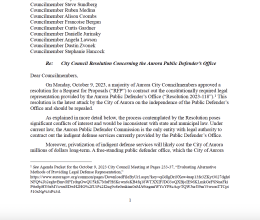Update: The Summer Without Police Violence rally was postponed in deference to the memorial service for fallen Denver Police Department Officer Celina Hollis.
By Rosalie Wilmot
Just days after the death of police brutality icon Rodney King, it’s important to remember that America is still steeped in a culture of police violence which threatens public safety and the very lives of people in our own communities.
On June 30, at noon, the ACLU of Colorado and its Race to Justice Coalition invite you to join in the rally: “A Summer Without Police Violence,” remembering those who have been victims of injustice at the hands of police and reminding law enforcement that there are activists watching them.
Each summer, as the hot months approach, we hold our breath; we hope that something, anything, even our advancements in technology, will result in less police brutality and violence. After all, wasn’t it technology that compelled our attention to the beating of Rodney King? Didn’t we pay attention because a witness captured that brutal beating on a video camera enshrining that moment for all time?
On June 30, 2011, the R2J Coalition, along with family members directly affected by police violence, clergy, racial justice activists, performers and others, will gather at the Van Cise-Simonet Detention Center to put law enforcement on notice: No brutality in Denver this summer.
Sadly, the history of summer police violence in our city reads like a roll call of injustice.
-- On July 5, 2003, 15-year-old Paul Childs was shot by Officer James Turney in a confrontation outside Child’s home. Though Childs was mentally disabled and may have been unable to comprehend the cops’ orders, the district attorney did not pursue charges though Childs was the second disabled teen Turney had shot in 18 months. Instead, Turney was given a 10-month suspension and the city paid Child’s family a $1.3 million settlement.
-- Fast-forward to May 2, 2009. Three officers beat 19-year-old Alex Landau into unconsciousness after he asked whether they needed a warrant to search his car. His injuries included a broken nose, a concussion and wounds that required 45 stitches. In photos, his facial features are completely unrecognizable. Still, none of the officers involved faced discipline from the city and two assaulted other people in the same year. The case was settled when the City Council agreed to pay Landau $795,000. Yet again, despite large payouts, there was no change.
-- In the summer of 2009, there were also brutal acts at the downtown Denver Diner. One of the same officers involved in the beating of Landau was involved in this one, too. Videotapes show several women being pushed and pepper-sprayed after they had been handcuffed. The Civil Service Commission decided the offenses didn’t merit removable from the force. The women’s’ attackers could return to the streets.
-- Rev. Marvin Booker’s death on July 9, 2010 was ruled a homicide and yet no punishment was ruled necessary for the five deputies by whose hands he died. He was beaten and Tasered in the Denver jail after refusing to sit down for booking on charges of failure to appear in court on drug paraphernalia charges. Denver’s Manager of Safety cleared the five deputies, finding that they didn’t violate the department’s use-of-force policy. Activists and Booker family members gathered a year later at the jail to commemorate his memory and demand action from newly-elected mayor Michael Hancock.
These acts of brutality are not only harrowing for the families of the victims, but also to those of us who live here and support police departments with our tax dollars.
We expect that our leaders and public officials will ensure a safe city where police use force responsibly -- and only when necessary to protect the public. When cops use slurs and excessive force, we don’t have a safe city. When African American men are targeted, we don’t have a safe city. When women, immigrants and disabled people are targeted, we don’t have a safe city. When Tasers are used in ways that make them deadly and lethal weapons, we’re not safe.
For me as a young person -- for all of us -- seeing a police officer should signal security and safety, not tension and fear.
That’s why I’ll be at the jail for the Summer Without Police Violence rally June 30. Please join us in exercising our civil rights and calling on the city of Denver to reform this system. The gathering will involve petition signing and voter registration as well as a true demonstration of solidarity.
The ACLU of Colorado Race to Justice Coalition says police brutality is killing us.
Let’s come together to end it.
Wilmot, a 2012 gradutate of the University of Denver, is a Media Intern at the ACLU of Colorado.
